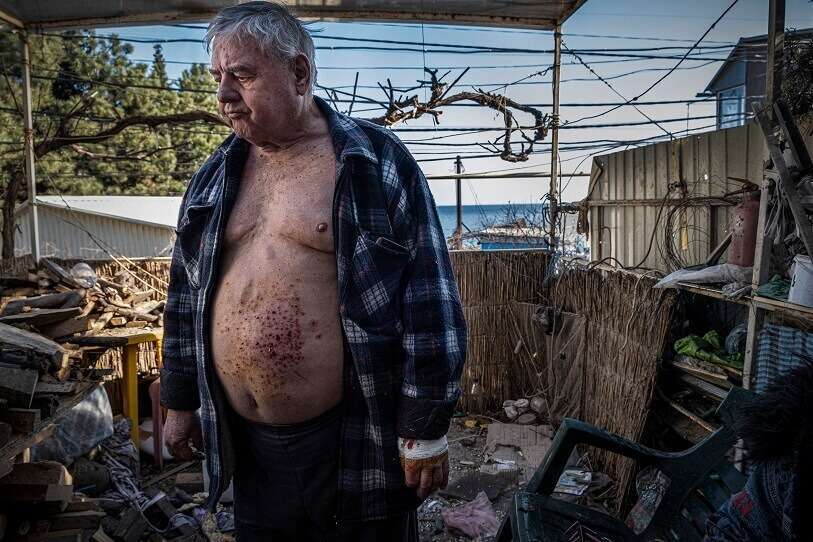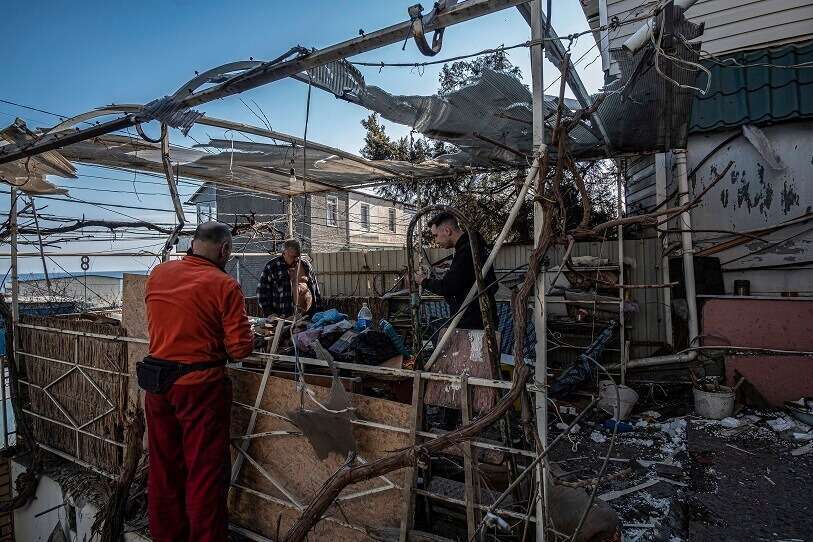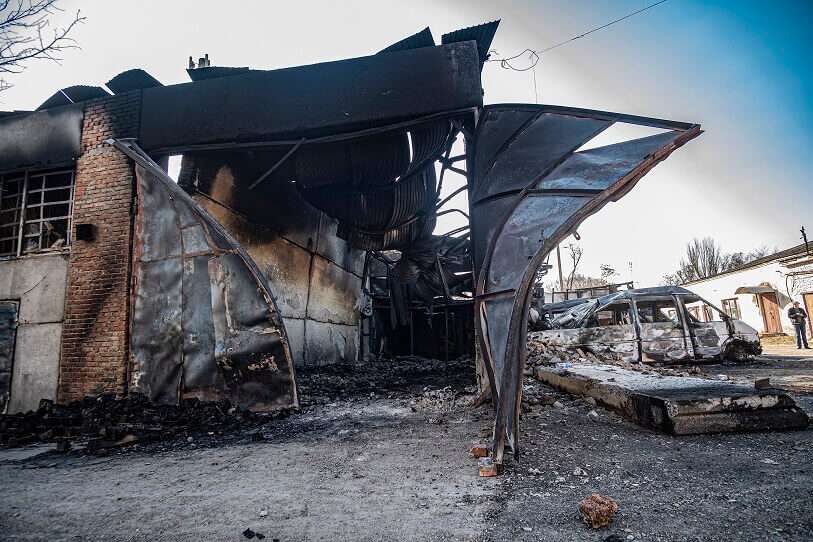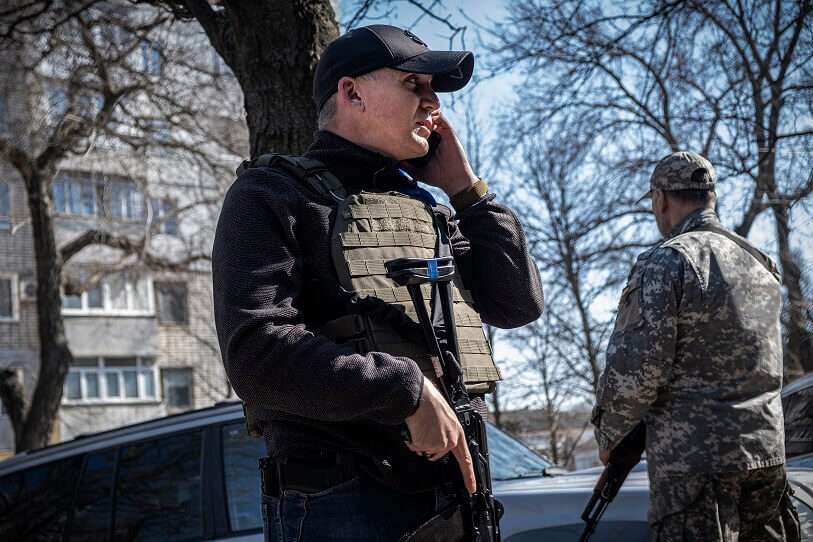El domingo negro de Odesa

It happened at around six o'clock on Sunday morning. At least ten explosions shook the windows of houses, waking up half the city. Some of these detonations were the result of Ukrainian anti-aircraft artillery, which managed to shoot down Kalibr-type missiles launched from Russian ships stationed in the Black Sea. But the shells that did manage to hit the fuel depots and the Odessa refinery.
The roar of the explosions was followed by a fire that could not be extinguished all day, and a huge column of smoke that dyed the sky black.
Vladimir Putin justified the attack on the grounds that the Ukrainian army was being supplied by the refinery. But the truth is that a few days earlier a video had gone viral showing two MI-24 helicopters - allegedly Ukrainian - bombing eight fuel depots in the Russian city of Belgorod, located some 40 kilometres from the border with the Donbas.
The Ukrainian government denied responsibility for the attack on Russian soil. But it was not enough to prevent a black Sunday in Odessa.
This port city had been largely unscathed by Russian offensives since the war began in Ukraine. It had received only one attack to date. That was on 21 March, when another naval attack blew up several houses in a quiet residential neighbourhood on the city's southern beachfront.

It was a demonstrative, short-range, low-firepower artillery attack. Most of the salvos launched by Putin's navy fell into the water, four rockets hit, and there was only material damage. But it was enough to overwhelm a city that until recently was a favourite holiday resort for Russians (those who can afford to go to spas, of course).
The Russian-speaking southeast of Ukraine, whose cities were founded by Catalina the Great, still does not understand why its neighbours are preying on a civilian population with whom they shared so much culturally.
Like the attack on the refinery, the first shelling of Odessa also took place at the stroke of six in the morning. This time there was no justification from the Kremlin, even though the rockets hit a tourist area known as Battery 411.
There, the more modest houses, with their uralite roofs covering their peaceful terraces, mingled with larger, more luxurious ones. All facing the sea. All inhabited by civilians, some of whom asked us, the international press who came to the site a few hours after the bombing, "Where were the military targets? Do you see any among our houses?"
There were no fatalities, but several neighbours were injured with cuts caused by window panes that were blown out by the explosion. "They had to pull them out of my stomach with tweezers," said Anatoli, also showing the wounds on his hand. His house was one of the worst affected. It was practically reduced to rubble.

"It all happened in a second," said Anatoli's wife Elena. She was still in shock, sitting on a green deck chair in the rubble, smoking one cigarette after another.
The couple had lived in the house for 15 years, where they were happy looking out to sea in retirement. It is very difficult to imagine what they felt at that moment, with their home in pieces. But Anatoli assured us before saying goodbye that, when everything is over, he will rebuild it with his own hands. He is 81 years old.
Just when the shelling of the beach houses seemed to be forgotten, along comes this new blow. The Odessa refinery becomes a fireball, and the Odessa people's confidence in diplomatic negotiations burns along with the oil that was stored in these fuel depots.
A week earlier, Putin had announced at the negotiating table that he was going to withdraw his troops in order to concentrate the war in the Donbas region in the east of the country. However, that same day he intensified shelling in southern cities such as Mikolaiv, the closest front line to Odessa, and where the Ukrainian armed forces are holding back the Russian advance on the ground.

Mikolaiv has been shelled almost daily since 24 February. The Russian army uses MSLR-type multiple rocket launchers and cluster bombs, which have been banned since 2010 by an international treaty ratified by almost all countries except Russia, the United States and China, among others.
Speaking to Atalayar, the mayor of Mikolaiv, Alexander Senkevich, said that "35% of the civilian population has fled the city". He also acknowledges that they are suffering major problems with the electricity supply because of the constant shelling. "More than a thousand workers are working every day to rebuild the damaged infrastructure, but there are still 50,000 people without electricity in the area closest to Kherson".
"When we don't come under fire during the day, it falls at night," continues the mayor of Mikolaiv, "and the Russians have tried to cross the Bug River several times, without success," he adds, explaining how the siege of this southern Ukrainian frontline town is going despite Putin's promises to withdraw to the Donbas.

The day after the attack on the refinery, the city of Odessa dawned again with the sound of anti-aircraft alarms echoing throughout the neighbourhoods. But for the moment, this soundtrack is not enough to deter the inhabitants, who have once again raised the shutters of their shops and gone about their business. They are not prepared to stop resisting.
On the other hand, 130 kilometres away in the town of Mikolaiv, the black Sunday was followed by a bloody Monday. One of the bloodiest bombings to date took place there, killing 10 people, including a child, and wounding more than 60. All of them civilians who were in the street or shopping in supermarkets and shops. Among the buildings affected were the Regional Clinical Hospital, the Centre for Disease Prevention and even an orphanage.
Criminal proceedings have already been initiated at the Regional Prosecutor's Office for "violating the laws and customs of war" (Part 1 of Article 438 of the Criminal Code of Ukraine). But actions on paper do not seem to be enough to make progress towards ending the war.








